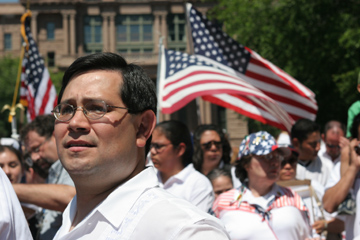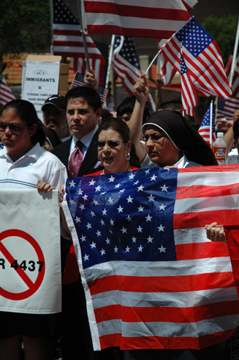 Govea: ‘ ... we really felt we had to make a statement here in Fort Worth.’
Govea: ‘ ... we really felt we had to make a statement here in Fort Worth.’
|
 The Fort Worth march was heavy on families, U.S. flags, and religious symbols.
The Fort Worth march was heavy on families, U.S. flags, and religious symbols.
|
|
A D V E R T I S E M E N T
|
|
|
|
A D V E R T I S E M E N T
|
|
Viva La Familia
Sunday’s immigration march could prove a turning point for local Hispanic politics.
By DAN MCGRAW
The number of immigration protest marchers in Dallas this past Sunday obviously dwarfed the number marching in Fort Worth. Crowd estimates put the people taking to the streets in Dallas at 350,000 to 500,000; in Fort Worth, police estimated it at 15,000 to 20,000.
But the numbers — and the message — the largely Hispanic protesters sent to Tarrant County politicians and voters was significant. Historically marginalized by the Fort Worth political way — be quiet, don’t take problems public, deal in the back room — the Hispanic leadership knew they had to make a statement Sunday, and the statement was as much about local politics as it was about national immigration reform issues.
In fact, the organizers of the Dallas march had pushed the Tarrant County Hispanic leadership to join with them and not hold a protest in Fort Worth. Unity was the theme, and the Dallas organizers thought that bringing all the Metroplex protesters into one spot to the east would reinforce that notion. But Cowtown’s Hispanics decided they needed to make their own statement.
“We were asked by the Dallas organizers to join them, but after we thought about it a bit, we really felt we had to make a statement here in Fort Worth,” said Alberto Govea, president of the local chapter of the League of United Latin American Citizens. “We have national and local politicians that represent Tarrant County, and we had to let them know that this immigration reform issue and others are important to our population. Politicians pay attention when they see the numbers like this.”
Govea said the Fort Worth organizers expected 1,000 to 2,000 people and would have been very happy with those numbers. “Most of our community doesn’t want to come out and create a ruckus, because that is the way things have always been done here,” Govea said. “But in so many ways, these issues have become a breaking point for a lot of us. It is a lighting rod that has gotten so many people involved, and these people who have never paid much attention to politics may change in how they approach politics.”
Whether the activism on one Sunday in the spring translates into more political power will take time to assess. Volunteers were moving through the crowd registering voters throughout the march, and though final numbers were unavailable, sources estimated that about 600 new voters were signed up. That may seem like a small number compared to the crowd on hand, but many voter registration drives take a year to add that many names to the voter rolls.
The immigration reform issues are complex, and the bills being debated in Washington could bring about felony convictions for illegal immigrants and those who help them once they’re here. But the numbers make such enforcement almost impossible. According to the Pew Hispanic Center, a Washington-based nonpartisan research organization, there are currently about 11.5 million to 12 million unauthorized migrants now living in the United States. About 56 percent of the unauthorized population comes from Mexico, and another 22 percent are from the rest of Latin America.
But perhaps the most striking numbers are those of the children of undocumented workers who, having been born here, are U.S. citizens. As of 2005, according to the Pew Center, there were 6.6 million families in the U.S. in which either the head of the family or the spouse was an unauthorized migrant. Nearly two-thirds of the children living in unauthorized families are U.S. citizens by birth — an estimated 3.1 million children in 2005.
And that was the main issue being highlighted by the marches in Fort Worth and Dallas and around the country. The border can be strengthened, and guest worker programs can be put in place to better regulate workers coming into the United States. But what to do with the 12 million or so illegals already here and working, and what to do with their children who are U.S. citizens?
Tino Castillo, a Tarrant County probation officer who deals with juvenile services, was at the march and said the issues are not as complex as some make them out to be. “What it boils down to is that we are going to make all these millions of hard-working immigrants criminals,” said Castillo, a third-generation Mexican-American. “I think some of these people calling for this change forget who they are. Just about all of us in this country have an immigrant background. And to make kids suffer so that some politicians can make a statement to their special interest groups is appalling.”
In some respects, it was the children of recent immigrants who were driving this protest. When high school students walked out of classes and marched in Fort Worth on March 27, they were roundly criticized for cutting class and waving Mexican flags. But the high school kids saw the immigration bills debated in Washington as a personal family issue, one that would affect them and their friends and relatives.
Martha Gallegos, 17, a junior at Trimble Tech High School, said most of the students marching that day didn’t know the specifics of the debate. “Some people said we should walk out, and the word spread that this was an important issue for us,” Gallegos said. “But it came down to families for us. The bills in Washington were talking about sending people who work hard and have families here to jail. In the last few weeks, the kids have been studying up on this. And I think they are doing it because they see a direct effect on their lives.”
Gallegos was born here, but her parents were born in Mexico. Both parents became citizens recently, but it took many years to get through the process. Baltazar Cordero, 17, a junior at Northside High School, has a similar background. He was born in Mexico, arriving here with his parents when he was eight months old. Cordero became a citizen last year, and his parents, both factory workers, are now legal residents.
Cordero is in the honors program at Northside and wants to be a surgeon some day, so he stayed in school to take a third-period test rather than participate in the walkout last month. But Cordero sees the students as having a perspective on the issue that the parents and grandparents don’t.
“For our generation, this was an eye- opener,” said Cordero, who spoke at the rally Sunday. “We’re proud of our heritage, but my generation thinks of ourselves as Americans. But we have to stand up for our parents and those hardworking people who are here to have a better life for their kids. The kids I have talked with think it is our duty to stand up and protect our families.
“Will we become more involved in politics than our parents?” Cordero asked. “Yes, because we see this as the way we can make changes. It’s been a wonderful experience for us. Most of the students I know can’t wait until they turn 18 so they can get out and vote.”
The family issue was front and center at the Sunday march in Fort Worth, which boasted almost as many baby strollers as American flags. And the organizers used the family message to weaken the case of those who want to put all illegals behind bars. The march was quiet and respectful, with religious leaders carrying a picture of Our Lady of Guadalupe and leading chants of “USA, USA” as they reached the federal courthouse. The event was then topped off by young kids reciting the pledge of allegiance in English. It was an effective way to put an American, patriotic face on those taking to the streets and to blunt criticism from some anti-immigrant groups who say unauthorized Mexican immigrants are responsible for gang activity, high levels of social service spending, and the loss of jobs for American citizens.
Fort Worth schools trustee Juan Rangel sees this march as a watershed event in local politics and believes it will result in higher levels of Hispanic political participation. And he gives credit to the kids who took the lead. “What happened [Sunday] was a unique event for Fort Worth,” Rangel said. “This was not about mistreatment based upon race or other factors. It was about the mistreatment of immigrants from all backgrounds who come to this country to make life better for their children. The kids were the ones who started reacting, and the children were bothered, and we as adults looked into their reaction. The kids may have waked up the sleeping giant.
“A lot of Americans don’t vote, and the Hispanic numbers in Tarrant County have always been low,” he continued. “Maybe we haven’t been as visible as we need to be, but this march may change things. We showed a face to Tarrant County and to the nation that was positive. We showed that immigrants are a positive force. And the way to deal with positive people is not by threatening them with jail.”
It could take years to fully judge the effect of Sunday’s march on local electoral politics. While Hispanics make up more than one-third of the population in Fort Worth — and about one-fourth in the county — that has never translated into any sizable numbers of elected officials.
“I spent more time at the protest telling people how to register to vote than anything else,” said LULAC’s Govea. “What was different this time was that we are approaching this as an American issue and not a Mexican issue. Most of the people marching were American citizens. But a lot of us have been asleep at the wheel when it comes to getting involved in the political process. Now they are waking up. And their kids have had a large role in waking them.”
 Email this Article...
Email this Article...

